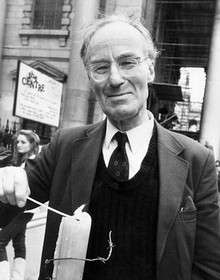Peter Benenson
| Peter Benenson | |
|---|---|
 Benenson lighting a candle in 1991 | |
| Born |
Peter James Henry Solomon 31 July 1921 London, England |
| Died |
25 February 2005 (aged 83) Oxford, England |
| Resting place | Nuneham Courtenay graveyard |
| Nationality | British |
| Known for | Founding the global human rights organization Amnesty International |
| Spouse(s) |
Margaret Anderson (?-1972; divorced; 2 children) Susan Booth (1973[1]-2005; his death; 2 children)[2] |
| Parent(s) |
Flora Benenson Harold Solomon |
Peter Benenson /ˈbɛnᵻn.sən/ (31 July 1921 – 25 February 2005) was a British lawyer and the founder of human rights group Amnesty International (AI). In 2001, Benenson refused all honours but in his 80s, largely to please his family, he accepted the Pride of Britain Award for Lifetime Achievement.[3]
Life and career
He was born in London as Peter James Henry Solomon, to a large Jewish family,[4] the only son of British-born Harold Solomon and Russian-born Flora Benenson; Peter Benenson adopted his mother's maiden name later in life. His army officer father died from a long-term injury when Benenson was aged nine, and he was tutored privately by W. H. Auden before going to Eton. At the age of sixteen he helped to establish a relief fund with other schoolboys for children orphaned by the Spanish Civil War. He took his mother's maiden name of Benenson as a tribute to his grandfather, the Russian gold tycoon Grigori Benenson, following his grandfather's death.
He enrolled for study at Balliol College, Oxford but World War II interrupted his education. He worked in Army Intelligence at the MoI where he met his first wife, Margaret Anderson. Benenson then worked at Bletchley Park, the British codebreaking centre, in the "Testery", a section tasked with breaking German teleprinter ciphers.[5] After demobilization in 1946, Benenson began practicing as a barrister before joining the Labour Party and standing unsuccessfully for election at Streatham in 1950 and for North Herts constituency till 1959.
He was one of a group of British lawyers who founded JUSTICE in 1957, the UK-based human rights and law reform organisation. In 1958, he fell ill and moved to Italy in order to convalesce. In the same year, he converted to the Roman Catholic Church.[6]
In 1961, Benenson was shocked and angered by a newspaper report of two Portuguese students from Coimbra sentenced to seven years in prison for raising their glasses in a toast to freedom[7] during the regime of António de Oliveira Salazar - the Estado Novo. In 1961, Portugal was ruled by the authoritarian Estado Novo regime, and anti-regime conspiracies were vigorously repressed by the Portuguese state police and deemed anti-Portuguese. He wrote to David Astor, editor of The Observer. On 28 May, Benenson's article, entitled "The Forgotten Prisoners", was published. The letter asked readers to write letters showing support for the students. To co-ordinate such letter-writing campaigns, Amnesty International was founded in London in July 1961 at a meeting of Benenson and six other men, who included a Tory, a Liberal and a Labour MP.[8][9] The response was so overwhelming that within a year groups of letter-writers had formed in more than a dozen countries.
Initially appointed general secretary of AI, Benenson stood down in 1964 owing to ill health. By 1966, Amnesty International faced an internal crisis and Benenson alleged that the organization he founded was being infiltrated by British intelligence. The advisory position of president of the International Executive was then created for him. In 1966, he began to make allegations of improper conduct against other members of the executive. An inquiry was set up which reported at Elsinore in Denmark in 1967. The allegations were rejected and Benenson resigned from AI.
While never again active in the organization, Benenson was later personally reconciled with other executives, including Seán MacBride. He died of pneumonia on 25 February 2005 at the John Radcliffe Hospital, Oxford, aged 83.[10]
References
- ↑ "Peter Benenson". benensonsociety.org.
- ↑ Philip Steele (2011). Activists (20th century lives). ISBN 978-1-44-883292-7.
- ↑ "Lifetime Achievement, Peter Benenson, Founder of Amnesty International". Pride of Britain Awards.
- ↑ "Peter Benenson hero file". Moreorless : Heroes and killers of the 20th century. Archived from the original on February 18, 2006.
- ↑ "GCHQ, Atlas and Virginia Tech: Jack Good". Computing at Chilton: 1961-2003. Retrieved 2011-10-12.
- ↑ "Peter Benenson" (PDF). Pax Christi.
- ↑ "Peter Benenson - Biography". Amnesty International.
- ↑ Tracy McVeigh (29 May 2012). "Amnesty International marks 50 years of fighting for free speech". The Observer.
- ↑ Childs, Peter; Storry, Mike, eds. (2002). "Amnesty International". Encyclopedia of Contemporary British Culture. London: Routledge. pp. 22–23.
- ↑ McFadden, Robert D. (February 28, 2005). "Peter Benenson, Founder of Amnesty Group, Dies at 83". The New York Times.
Sources
- Pincock, S.: Peter James Henry Solomon Benenson (obituary). Lancet, April 2, 2005; 365: 1224.
External links
| Wikiquote has quotations related to: Peter Benenson |
| Non-profit organization positions | ||
|---|---|---|
| Preceded by None |
President of Amnesty International 1961–1966 |
Succeeded by Eric Baker |